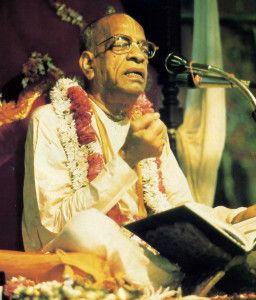Hare Krishna.
29th March, 2014, Gurgaon.
Q1: How many types of Bhakti is explained in Caitanya-caritāmṛta ? Explain them.
Answer : Srila Prabupada writes in the purport of CC Adi 4.21-22 :
In the Caitanya-caritāmṛta three kinds of devotional service are described — namely, bhakti (ordinary devotional service), śuddha-bhakti (pure devotional service) and viddha-bhakti (mixed devotional service).
When devotional service is executed with some material purpose, involving fruitive activities, mental speculations or mystic yoga, it is called mixed or adulterated devotional service. Besides bhakti-yoga, the Bhagavad-gītā also describes karma-yoga, jñāna-yoga and dhyāna-yoga. Yoga means linking with the Supreme Lord, which is possible only through devotion. Fruitive activities ending in devotional service, philosophical speculation ending in devotional service, and the practice of mysticism ending in devotional service are known respectively as karma-yoga, jñāna-yoga and dhyāna-yoga. But such devotional service is adulterated by the three kinds of material activities.
For those grossly engaged in identifying the body as the self, pious activity, or karma-yoga, is recommended. For those who identify the mind with the self, philosophical speculation, or jñāna-yoga, is recommended. But devotees standing on the spiritual platform have no need of such material conceptions of adulterated devotion. Adulterated devotional service does not directly aim for love of the Supreme Personality of Godhead. Therefore service performed strictly in conformity with the revealed scriptures is better than such viddha-bhakti because it is free from all kinds of material contamination. It is executed in Kṛṣṇa consciousness, solely to please the Supreme Personality of Godhead.
Those who are spontaneously devoted to the Lord and have no aims for material gain are called attracted devotees. They are spontaneously attracted to the service of the Lord, and they follow in the footsteps of self-realized souls. Their pure devotion (śuddha-bhakti), manifested from pure love of Godhead, surpasses the regulative principles of the authoritative scriptures….. The regulative principles help ordinary devotees rise to the stage of perfect love of Godhead. Pure love for Kṛṣṇa is the perfection of pure devotion, and pure devotional service is identical with spontaneous devotional service.
Q2: What is viśuddha-sattva ? What is miśra-sattva ?
Answer : Srila Prabhupada writes it in his purport to CC Adi 4.62 as below
In his thesis Bhagavat-sandarbha (103), Śrīla Jīva Gosvāmī explains the potencies of the Lord as follows: The transcendental potency of the Supreme Personality of Godhead by which He maintains His existence is called sandhinī. The transcendental potency by which He knows Himself and causes others to know Him is called samvit. The transcendental potency by which He possesses transcendental bliss and causes His devotees to have bliss is called hlādinī. The total exhibition of these potencies is called viśuddha-sattva…..
In the mundane mode of goodness there are tinges of passion and ignorance. Therefore mundane goodness, being mixed, is called miśra-sattva. But the transcendental variegatedness of viśuddha-sattva is completely free from all mundane qualities. Viśuddha-sattva is therefore the proper atmosphere in which to experience the Personality of Godhead and His transcendental pastimes.
In the Tenth Canto of Śrīmad-Bhāgavatam (10.27.4), Indra praises Kṛṣṇa as follows:
viśuddha-sattvaḿ tava dhāma śāntaḿ tapo-mayaḿ dhvasta-rajas-tamaskam
māyā-mayo ‘yaḿ guṇa-sampravāho na vidyate te ‘grahaṇānubandhaḥ
“My dear Lord, Your abode is viśuddha-sattva, always undisturbed by the material qualities, and the activities there are in transcendental loving service unto Your feet. The goodness, austerity and penance of the devotees enhance such activities, which are always free from the contamination of passion and ignorance. Material qualities cannot touch You under any circumstances.”
Srila Prabhupada further expands it in his purport of CC Adi 4.62
Lord Kṛṣṇa’s father, mother and household affairs are all displayed in the same viśuddha-sattva existence. A living entity situated in the status of pure goodness can understand the form, qualities and other features of the Supreme Personality of Godhead. Kṛṣṇa consciousness begins on the platform of pure goodness.When the living entity is situated in viśuddha-sattva, transcendental to the three material modes of nature, he can perceive the form, quality and other features of the Supreme Personality of Godhead through his service attitude. The status of pure goodness is the platform of understanding, for the Supreme Lord is always in spiritual existence.
All glories to Sri Guru and Gauranga.
All glories to Srila Prabhupada.

